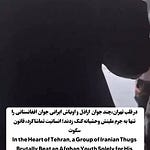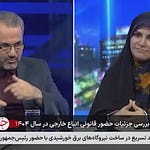Mohajir Times: The recent arrest of the father of Fereshteh Hosseini, a prominent Iranian actress of Afghan descent, has provoked widespread reactions across social media, news outlets, and the public sphere in Iran and Afghanistan. Navid Mohammadzadeh, a leading figure in Iranian cinema and Fereshteh Hosseini’s husband, strongly criticized the incident in a video shared on social media.
According to Mohammadzadeh, his father-in-law was arrested by police officers at 7 a.m. in his own home, despite having lived legally in Iran for more than 30 years and possessing a valid Amayesh (Residency Card). In his video statement, Mohammadzadeh condemned the treatment of his father-in-law and called the arrest unjustifiable, emphasizing that detaining an individual with legal documentation is indefensible.
He called on the authorities to take responsibility, and do an apology. The news rapidly gained traction across media platforms and triggered strong responses from users and social activists. Many expressed deep concern over the incident and demanded clarity regarding the reasons for the arrest. As the father of a public figure and a respected member of the Afghan refugee community in Iran, his detention has once again drawn public attention to the broader issue of the treatment of legally documented Afghan migrants, and refugees in the country.
In recent months—particularly following the escalation of conflict between Iran and Israel—there has been a significant increase in the deportation of undocumented Afghan migrants, and refugees raising widespread concern among migrant families in Iran. However, alongside these deportations, many legally residing individuals, even those with Amayesh cards, passports, or long-term residence permits, have also faced arrest and the threat of expulsion. These actions, especially targeting long-term residents, reflect a growing hardline policy that threatens the mental and social security of Iran’s migrant population. Human rights defenders and migrant advocacy groups have called for an immediate halt to such measures and for the Iranian government to uphold the legal rights of refugees and migrants living within its borders.
Fereshteh Hosseini, a talented actress in film and television, was born on April 26, 1997, in Tehran to an Afghanistani refugee family. She began her artistic career at the age of nine through theater, and she later solidified her craft by studying acting under renowned instructors such as Mahtab Nasirpour and Mohammad Rahmanian. Her first major cinematic appearance was in the film Parting (Raftan), directed by Navid Mahmoudi—a role that earned her the Best Actress award at the Marrakech International Film Festival.
She later gained greater recognition with her portrayal of “Leila” in the popular television series Frog (Ghoorbagheh). In 2021, she received an Honorary Diploma for Best Supporting Actress at the Fajr Film Festival for her performance in Squad of Girls (Dasteh Dokhtaran). Beyond her artistic achievements, Hosseini has consistently used her platform to amplify the voices of Afghan women and migrants in Iran, speaking out against discrimination and advocating for the rights of minorities. In 2021, she married Navid Mohammadzadeh, one of Iran’s most acclaimed actors. Today, Fereshteh Hosseini is widely regarded as one of the most influential and promising figures of the new generation in Iranian cinema.













Share this post